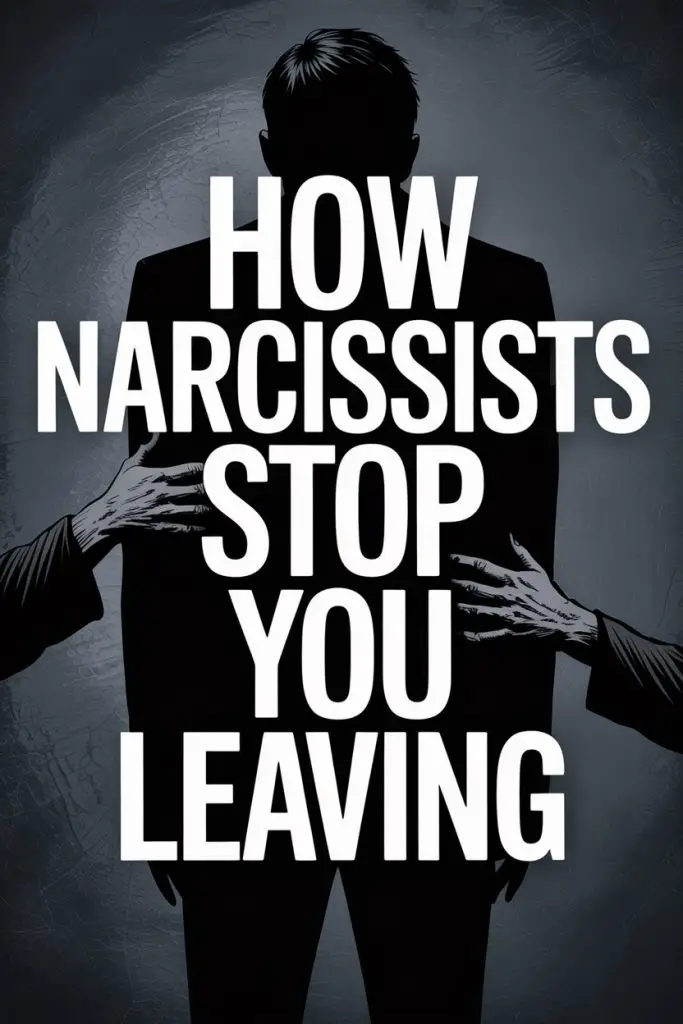Leaving a narcissist isn’t just walking out the front door with your suitcase and a flourish worthy of a Netflix drama.
No, it’s more like performing an emotional limbo while the bar keeps getting lower, and the audience is jeering—disguised as “concern.”
If you’ve ever tried to untangle yourself from a narcissist, you know exactly how sticky (and acrobatic) that process can get.
Let’s cut through the confusion and see exactly how narcissists are so weirdly good at stopping people from leaving—and, even better, what you can do about it.
Emotional Blackmail Wears Many Outfits
Narcissists have a closet full of manipulative tactics, and emotional blackmail is their favorite little black dress. They’ll try “If you leave, I’ll fall apart,” or its close cousin, “No one else will ever love you like I do.”
Sometimes the threats are subtle. A narcissist might imply they’re unwell, unstable, or in desperate need—painting themselves as the world’s most pitiful victim.
Other times, it’s full-on melodrama, starring them as the hero, the villain, and the audience, all at once.
This tactic works because empathy is a beautiful (and sometimes doormat-shaped) human trait. When someone threatens to spiral if you walk away, it’s hard not to feel like you’re holding the detonator.
But here’s the kicker: their threats aren’t an actual reflection of your value or responsibility. They’re manipulation, pure and simple.
Love Bombing Makes You Doubt Your Reality
Remember that time they swept you off your feet with romantic gestures, compliments, and over-the-top promises? When you try to leave, the narcissist hits the replay button on that honeymoon phase.
Suddenly, they’re back to being the person you fell for—charming, attentive, “changed.”
Cue the candle-lit apologies, the tearful vows of self-improvement, the “I’ll go to therapy, I promise!” speeches that rival Oscar acceptance monologues.
Love bombing is designed to make you question if things were ever really that bad, to get you hooked on the hope that this time, things will be different.
Spoiler alert: things aren’t different. Love bombing is a tactic, not a transformation.
Gaslighting Until You Can’t Trust Your Own Feelings
If you’ve ever caught yourself thinking, “Maybe I am overreacting,” congratulations—you’ve probably been gaslit. Narcissists are Olympic-level reality benders.
They’ll twist your words and rewrite history, making you question your memory, your sanity, and even your most basic instincts.
They may insist that you’re too sensitive, that they never said what you remember, or that you’re imagining problems. It’s exhausting. It’s confusing.
It’s also one of the main reasons people stick around: when your perception of reality is under constant attack, making decisions (like leaving) feels impossible.
Isolation Keeps You Dependent
Narcissists know that support from friends and family is the biggest threat to their control. If you’re surrounded by a community that loves you, you might just get the confidence to leave. Enter the isolation tactics.
They’ll subtly (or not-so-subtly) undermine your relationships. Suddenly, your friends are “jealous” or “don’t understand” your partner. Your family is “too involved” or “causing drama.”
Before you know it, your world shrinks until the narcissist is the sun, moon, and entire weather forecast.
Without outside voices to offer perspective, their narrative becomes your reality. And that’s exactly how they like it.
Guilt Trips That Would Impress Your Gran
Ever been guilt-tripped so hard you felt like you owed someone a kidney? Narcissists are pros at this.
They’ll remind you of every favor, every sacrifice, every moment they “stood by your side” (even if those moments look a bit fuzzy under closer inspection).
If you’re a parent, this is where the “think of the children!” chorus gets loud. If not, it might be “after everything I’ve done for you,” or “nobody else would put up with you.”
The goal is simple: keep you rooted in place with the weight of obligation.
Playing the Victim Card Like It’s a Full House
Narcissists can switch from tyrant to martyr faster than an actor changing costumes at panto. When you try to leave, suddenly you’re the villain, breaking their tender heart, destroying their dreams, “ruining their life.”
They might cry in front of mutual friends or family, spinning a tale about how hard you’ve been on them. If you’re really lucky, they’ll post cryptic statuses on social media, collecting sympathy like it’s a new hobby.
All of this is designed to flip the script, making you question your own actions and, ideally, run back with an apology. Don’t fall for it. Their suffering is a performance, not a fact.
The Threat of Retaliation
Some narcissists skip the emotional blackmail and go straight for intimidation. They might threaten to ruin your reputation, fight for custody, or air your secrets to anyone who’ll listen.
Sometimes the threats are even more personal (“If I can’t have you, no one will”).
This isn’t just scary—it’s meant to be. Fear is a powerful motivator, and narcissists know you’re less likely to leave if you’re terrified of what comes next.
Document everything, keep receipts, and don’t hesitate to get outside help if you feel unsafe.
Financial Control Tightens the Trap
Money may not buy happiness, but it sure keeps a narcissist in charge. Financial abuse is a common tool, from controlling your spending to sabotaging your ability to work.
If you have to ask for every penny, it’s a lot harder to imagine a life on your own.
Sometimes it’s as blatant as taking your credit cards or refusing to pay shared bills. Other times, it’s more subtle—undermining your career, “losing” your paperwork, or guilt-tripping you for wanting any independence.
Feeling stuck financially is not the same as being stuck forever. There are resources and strategies that can help you build a bridge out, even if the first step is just socking away a little bit of cash in secret.
Hot and Cold Treatment Keeps You Off Balance
Ever had a partner who is sweet one minute and frosty the next? Narcissists are masters at “intermittent reinforcement”—giving you crumbs of affection just often enough to keep you craving more, then pulling it away.
This unpredictability makes you work harder for their approval. When things are good, your brain gets a hit of relief, and you forget how bad the lows felt.
The result: you’re always guessing, always hoping, always waiting for the next high.
It’s not love. It’s emotional whiplash.
Erosion of Self-Esteem
Over time, a narcissist’s constant criticism, belittling, and backhanded compliments can grind down even the most robust self-esteem.
They’ll undermine your confidence, making you believe you’re too flawed, too needy, too something to do any better.
If you believe you’re unworthy of love—or incapable of surviving on your own—leaving feels like climbing Everest in flip-flops.
But here’s the reality check: the only thing wrong with you is that you’ve been told, over and over, that something’s wrong with you.
The “Future Faking” Trap
Narcissists are world-class promise makers (“Next year, we’ll move somewhere new and start over!”) but terrible promise keepers. When you start eyeing the exit, suddenly there are grand plans, future vacations, even engagement rings.
None of it materializes. Or if it does, there’s always a catch. The idea is to keep you invested in a potential that never arrives, stringing you along with visions of a better tomorrow.
If you’re always waiting for things to get better, you’ll never leave today.
How To Push Past The Barriers
Recognizing these tactics is half the battle. The other half? Building the strength (and the strategy) to leave, even when it feels impossible.
Start with one small act of resistance. Talk to a trusted friend, squirrel away some funds, or reach out to a professional. Every step chips away at the narcissist’s hold.
Reconnect with people outside the relationship—even if you feel embarrassed or isolated. Most folks are more understanding than you think (and have probably seen more than one episode of this drama before).
Therapy, support groups, and even anonymous online forums can offer perspective and encouragement.
Safety always comes first. If threats are involved, document everything and make a plan with someone who can help. There’s no shame in asking for backup.
Reclaiming Your Life—And Your Sanity
Leaving a narcissist isn’t a single act, but a series of choices—each one a little reclaiming of your time, your confidence, and your sanity. The path out may be winding, messy, and full of detours, but it is there.
Give yourself some grace. You didn’t end up here because you’re weak or foolish, but because you trusted, cared, and tried. Those are strengths, not flaws.
The more you see the tactics, the more immune you become. And when you’re finally free, the only thing you’ll regret is not escaping sooner.
Just don’t forget to take your self-worth with you when you go. You’ll need it for whatever—and whoever—comes next.


